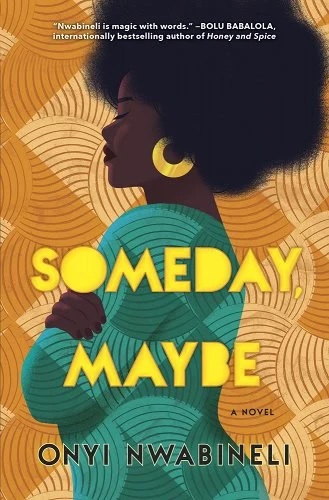 A young woman struggles through anguish and depression after her husband dies by suicide in Someday, Maybe, the raw, honest first novel from Nigerian British author Onyi Nwabineli.
A young woman struggles through anguish and depression after her husband dies by suicide in Someday, Maybe, the raw, honest first novel from Nigerian British author Onyi Nwabineli.
"Here are three things you should know about my husband," main character Eve tells readers, going on to say that she loved Quentin deeply, he seemed happy and yet, "he committed suicide." She says of herself, "Here is one thing you should know about me: 1. I found him. Bonus fact: No. I am not okay." The aftermath leaves her unable to do more than lie in bed and try to catch his scent from a sweatshirt. Her close-knit Nigerian-British family rallies around her with food, prayers and nudges to return to life, but grief consumes her as she tries to take stock of her new reality. A steady diet of prescription pills dulls the pain but ultimately sends Eve into a deeper spiral that ends in the loss of her job. Complicating matters further is Aspen, Quentin's mother, who always disapproved of Eve as a daughter-in-law and now blames her for Quentin's death. As Eve freefalls into despair, a surprising revelation upends her world yet again, driving her briefly to flee in search of the answers behind Quentin's actions. Eve's best friend and family want to stand by her, but her avoidance of Aspen's castigating phone calls and frivolous lawsuit accidentally drags them into the mess. Eve must find a way to move forward when the love of her life has removed himself from it.
Nwabineli's perceptive, painstaking interrogation of loss and depression is told in Eve's candid, sarcastic voice. Often the fictional journey of a bereaved character is portrayed as a smooth, uplifting arc. Here, readers will find grief portrayed realistically as a complex, long-lived creature that embeds itself deeply, shifting but always present. Nwabineli also declines to offer any posthumous explanations from Quentin and instead imbues Eve's loss with an added layer of incomprehension, a horrible riddle with no solution. Interstitial scenes in which Eve looks back on her courtship and marriage to Quentin bring lightness and establish their deep connection. Her savvy, outspoken friends and family are fully realized characters who each offer a different dimension of support and wisdom in her time of need. Readers ready for a challenging pilgrimage through tragedy will find rewards in Nwabineli's clear-eyed, compassionate take on the often-unremarked messiness of survival. --Jaclyn Fulwood, blogger at Infinite Reads
Shelf Talker: Nwabineli's first novel is a clear-eyed, compassionate take on grief as a young widow struggles with depression following her husband's suicide.
 "Literacy is so important to society. The idea that people can passively, in a way, and in a solitary way, take on information. We are always being fed so much--whether it's Facebook or whatever, things are being put in our face--but here, readers take the time to select. 'What will I learn about now?' 'What will I read about now?' I'm sure it alters your brain patterns, and I think it does make for a nicer person. We are so lucky. You hear horror stories of retail or restaurants, but we don't get that because, as I say, our readership has already pre-sorted people that are coming in the bookstore."
"Literacy is so important to society. The idea that people can passively, in a way, and in a solitary way, take on information. We are always being fed so much--whether it's Facebook or whatever, things are being put in our face--but here, readers take the time to select. 'What will I learn about now?' 'What will I read about now?' I'm sure it alters your brain patterns, and I think it does make for a nicer person. We are so lucky. You hear horror stories of retail or restaurants, but we don't get that because, as I say, our readership has already pre-sorted people that are coming in the bookstore."




SHELFAWARENESS.1222.S1.BESTADSWEBINAR.gif)



 Registration for the American Booksellers Association's 18th annual Winter Institute--Wi2023--to be held in Seattle, Wash., February 20-23, 2023, opens on Wednesday, September 14 at 1 p.m. Eastern. Registration is through the
Registration for the American Booksellers Association's 18th annual Winter Institute--Wi2023--to be held in Seattle, Wash., February 20-23, 2023, opens on Wednesday, September 14 at 1 p.m. Eastern. Registration is through the SHELFAWARENESS.1222.T1.BESTADSWEBINAR.gif)
 Barnes & Noble, one of the original tenants of the Avenue at White Marsh shopping center in Baltimore, Md., will close temporarily to remodel. In a
Barnes & Noble, one of the original tenants of the Avenue at White Marsh shopping center in Baltimore, Md., will close temporarily to remodel. In a 

 Posted by
Posted by  Spotted at
Spotted at  A Place for Pauline
A Place for Pauline A young woman struggles through anguish and depression after her husband dies by suicide in Someday, Maybe, the raw, honest first novel from Nigerian British author Onyi Nwabineli.
A young woman struggles through anguish and depression after her husband dies by suicide in Someday, Maybe, the raw, honest first novel from Nigerian British author Onyi Nwabineli.